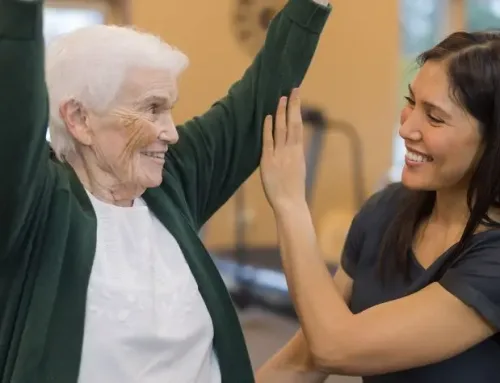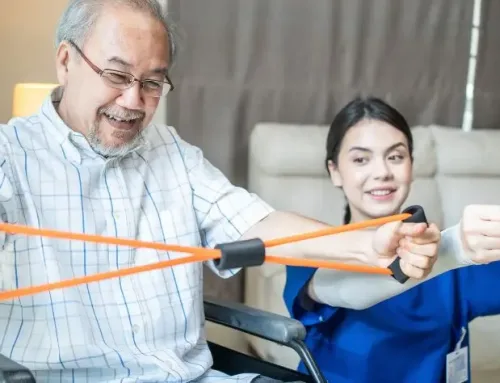How Much Do Occupational Therapists Make? Salary Insights and Career Growth

How much do occupational therapists make? It’s a question plenty of people ask when considering a career in this rewarding and growing field. Occupational therapy (OT) is all about helping people regain independence and improve their daily lives—whether they’re recovering from an injury, managing a disability, or adapting to new challenges.
Of course, passion for the work matters, but salary is a key factor in any career decision. Knowing what to expect when it comes to pay, what can influence earnings, and where this career can take you makes a big difference. In this article, we’ll break it all down and show you how our Doctor of Occupational Therapy (OTD) program at SCU California can help you build a future you’re excited about.
How Much Do OTs Make? Salary Breakdown & Growth Trends
If you’re thinking about becoming an occupational therapist, salary is probably on your mind. The good news? OT pays well and offers strong job security.
Not only do occupational therapists earn solid pay, but demand for OTs is growing fast. The profession is expected to expand 11% from 2023 to 2033, far outpacing many other careers. Whether you’re drawn to OT for its impact or its financial stability, now is a great time to get into the field. Let’s break down the numbers.
Occupational Therapist Salary Overview
Occupational therapy continues to be a financially stable and growing profession. According to the Bureau of Labor Statistics (BLS), the median annual wage for occupational therapists in the U.S. was $96,370 in 2023. That’s a solid paycheck, with plenty of room for growth as experience and specialization come into play.
In California, the earning potential is even higher. The annual mean wage for occupational therapists in the state is $113,550, significantly above the national average.
Overall, salaries vary depending on location, setting, and credentials, but OT remains a well-paying career that offers both stability and upward mobility.
What Affects OT Salaries?
Several factors influence how much an OT makes, including:
- Experience: Entry-level salaries are strong, but earnings grow with years in the field. The longer you work, the more you refine your skills, build connections, and open doors to higher-paying roles. Many experienced OTs also step into mentorship or leadership positions, which come with bigger paychecks.
- Work Setting: Where you work matters—a lot. Hospitals and nursing facilities tend to pay more because they often handle complex cases and require OTs to work with a broader range of patients. Schools and outpatient clinics can be great environments, but salaries there might not be as high since the workload and patient needs are typically different.
- Specialization: Not all OTs do the same thing, and the more specialized your skill set, the better your earning potential. Whether it’s hand therapy, neurological rehabilitation, pediatrics, or assistive technology, becoming an expert in a high-demand area can put you in a stronger position for raises, promotions, or even private practice.
- Location: Big cities and high-demand regions tend to pay more, but cost of living plays a role, too. High-demand areas, especially urban centers, tend to pay more.
Beyond the Starting Salary: How OTs Increase Their Earning Potential
Occupational therapy is a career with real earning potential. Salaries don’t stay static, and the more you invest in your skills, experience, and connections, the higher your paycheck climbs.
How OT Salaries Grow Over Time
Occupational therapists start with solid earnings, but the real financial rewards come with experience and career moves. New grads can expect entry-level salaries, but as skills sharpen and expertise builds, paychecks increase.
Mid-career OTs who take on leadership roles, gain advanced certifications, or specialize in high-demand areas often see a significant salary jump. Those who continue pushing their careers forward—whether through education, management positions, or private practice—often land in top-tier earning brackets.
The Power of Education and Advanced Degrees
- More Knowledge, More Pay: Advanced degrees, like a Doctor of Occupational Therapy (OTD), can open doors to higher-paying roles, including leadership, academia, and specialized practice.
- Certifications Matter: Earning additional certifications in areas like hand therapy, lifestyle medicine, or assistive technology can set you apart and boost your earning potential.
- Staying Competitive: Healthcare evolves fast. OTs who stay ahead through continuing education often land better opportunities and salary bumps.
How Mentorship, Networking, and Specialization Impact Your Career
Who you know, what you specialize in, and how you build your career all play a huge role in how much you earn.
Mentorship can accelerate career growth by providing guidance, insider knowledge, and access to new opportunities. Networking—whether through conferences, professional organizations, or social media—connects OTs to high-paying roles, collaborations, and new career paths. Specialization in areas like pediatrics, mental health, or assistive technology can set you apart and make you a go-to expert in your field, increasing both your job options and salary potential.
At SCU, you’ll be privileged to study with an esteemed faculty helmed by Dr. Heather Thomas. The faculty at SCU are pioneering leaders in Occupational Therapy, boasting a diverse range of backgrounds and expertise that spans neuro-rehabilitation, mental health, pediatrics, and clinical and hospital-based settings.
At SCU, you’ll have access to one-on-one attention from a specialized faculty that’s devoted to the continued academic and professional success of its students, as evidenced by SCU’s highly accomplished alumni.
Ready to Elevate Your OT Career? SCU’s Doctorate Can Get You There
A career in occupational therapy has endless possibilities—but the right education can take you further, faster. Our Doctor of Occupational Therapy (OTD) program is designed for ambitious professionals ready to step into leadership, earn more, and make a bigger impact in the field.
A Smarter, More Flexible Way to Earn Your OTD
At SCU, we know that career advancement shouldn’t mean putting your life on hold. Our online-blended format allows you to complete most of your coursework remotely while gaining hands-on clinical training during scheduled on-campus sessions.
We also make it easier to start. Unlike most OTD programs, you don’t need a bachelor’s degree to apply. As long as you have 90+ college credits, you can begin your journey toward a doctorate.
What Makes SCU’s OTD Program Stand Out?
- Flexible, Remote-Friendly Format: Our online-blended program is designed for real life. During your first year, you’ll complete 80% of your coursework from home, attending live online classes. While the majority of your classes are online, not all online programs are the same. Unlike the generic and boring pre-recorded lectures offered by many other colleges and universities, SCU’s lessons are conducted in a live, synchronous fashion, prioritizing student engagement through active learning and practical application.
- Clinical Rotations + Hands-On Experience: You’ll join us on-campus in Whittier, California for three weeks at the end of each term for hands-on clinical training. After year one, your clinical rotations happen at partner sites—either close to home or in a U.S. city you’re excited to explore. With small class sizes, one-on-one faculty support, and firsthand practical training, you can be sure that your educational experience will be personal, interpersonal, and meaningful.
- Capstone Project That Reflects Your Passion: You’ll complete a student-led capstone project tailored to your interests, supported by a dedicated mentor and online seminars. The project includes written, experiential, and oral components and can open doors to publications, future research, or professional advancement.
- Hands-On Learning with Real Tech: We integrate cutting-edge tools like a clinical driving simulator, 3D printing, and interactive anatomy platforms like Complete Anatomy and Draw It to Know It to prepare you for real-world clinical challenges.
By incorporating virtual reality technology, you’ll create an immersive experience that enhances patient engagement and provides a controlled, adaptable setting for targeted therapeutic interventions, ultimately leading to more effective treatment outcomes.
Career Growth and Earning Potential
Earning an OTD uniquely positions you for leadership and higher-paying roles. Graduates can pursue advanced clinical specialties, management roles, academic appointments, and research or administrative positions. Many OTs with a doctorate step into roles such as:
- Clinical Director Leading rehabilitation teams and shaping care delivery strategies.
- Advanced Practitioner Specializing in areas like neurorehabilitation, pediatrics, or assistive technology.
- Healthcare Consultant Advising clinics, hospitals, and private practices on operations, outcomes, and systems of care.
- Academic Faculty Teaching in OT programs, mentoring future practitioners, and contributing to curriculum development.
- Researcher Conducting studies that advance the profession and improve clinical effectiveness.
- Hospital Administrator Overseeing departments, managing interdisciplinary teams, and influencing policy and care standards.
The field of occupational therapy is evolving, and those who lead the way will shape its future. Our OTD program is designed for professionals who don’t just want a job—they want to make a lasting impact in the field.
Advance, Specialize, and Earn More with SCU
How much do occupational therapists make? It depends on experience, location, and education—but one thing is clear: earning a Doctor of Occupational Therapy (OTD) opens doors to leadership roles, specialization, and higher salaries. With demand for OTs growing and salaries climbing, there’s never been a better time to invest in your future.
At SCU, we make that next step possible. With our flexible, innovative OTD program, you can build the career you want—without putting your life on hold. Take a look at our admission requirements and see how you can get started. The future of your OT career is waiting. Apply today.
FAQs
How much do occupational therapists make on average?
According to the Bureau of Labor Statistics, the median annual salary for occupational therapists in the U.S. is $96,370, while in California, the annual mean wage is $113,550. Salaries can vary based on experience, specialization, and work setting.
What factors impact an occupational therapist’s salary?
Experience, location, work setting, and specialization all play a role. OTs in hospitals or rehabilitation centers often earn more than those in schools, and specializing in high-demand areas like neurorehabilitation or pediatrics can boost earning potential.
Does earning a Doctor of Occupational Therapy (OTD) increase salary potential?
It can! Earning an OTD doesn’t automatically mean a higher salary compared to master’s-level OTs—clinicians in similar roles are often paid the same. However, an OTD can open the door to leadership, academic, and specialized roles where salaries are typically higher. It’s the role you step into—not just the degree—that drives earning potential.
What kind of hands-on experience will I get at SCU?
At SCU, you’ll get real-world clinical experience through short, immersive sessions on our Whittier, California campus, complemented by clinical rotations close to home or even in a new city you’re excited to explore. Rather than sticking to one type of patient, you’ll engage with diverse communities and collaborate across multiple healthcare disciplines—preparing you to thrive in a truly integrated healthcare environment.
How does SCU’s OTD program prepare students for leadership roles?
Leadership isn’t an afterthought in our curriculum—it’s built in. SCU’s OTD program includes a dedicated course on leadership and management in healthcare, giving students the tools to step confidently into supervisory and administrative roles.
Students also receive advanced preparation for certification in both lifestyle medicine and physical agent modalities, expanding their clinical expertise and positioning them for higher-responsibility roles across healthcare settings.
Traditional healthcare often focuses solely on the physical body, overlooking the complex factors that impact a patient’s overall health. At SCUHS, our integrative whole healthcare approach teaches you to combine the best of conventional and complementary methods to treat the whole person – mind, body, and spirit – for lasting wellness.
Related Posts




